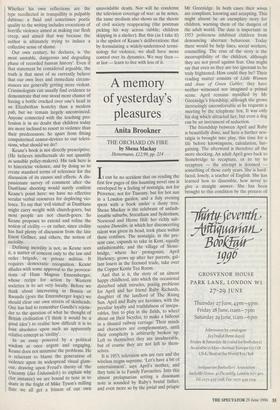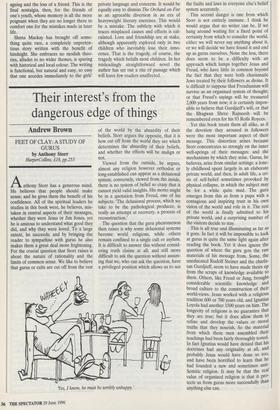A memory of yesterday's pleasures
Anita Brookner
THE ORCHARD ON FIRE
It can be no accident that on reading the first few pages of this haunting novel one is enveloped by a feeling of nostalgia, not for Provence, not for Tuscany, but for hot sun in a London garden, and a July evening spent with a book under a dusty tree. Shena Mackay is the celebrant of unfash- ionable suburbs, Streatham and Sydenham, Norwood and Herne Hill: her richly sub- versive Dunedin, in which her disconcerting talent was given its head, took place within these confines. The nostalgia, in the pre- sent case, expands to take in Kent, equally unfashionable, and the village of Stone- bridge, where her protagonist, April Harlency, grows up after her parents, gal- lant losers in the licensed trade, take over the Copper Kettle Tea Room. And that is it, the story of an almost happy childhood, into which the occasional disturbed adult intrudes, posing problems for April and her friend Ruby Richards, daughter of the landlord of The Rising Sun. April and Ruby are heroines, with the peculiar loyalty and truthfulness of insepa- rables, free to play in the fields, to wheel about on their bicycles, to make a hideout in a disused railway carriage. Their minds and characters are complementary, until their complicity is arbitrarily broken up. Left to themselves they are invulnerable, but of course they are not left to them- selves.
It is 1953; television sets are rare and the wireless reigns supreme. 'Let's have a bit of entertainment', says April's mother, and they tune in to Family Favourites. Into this almost prelapsarian setting a dissonant note is sounded by Ruby's brutal father, and even more so by the jovial and priapic Mr Greenidge. In both cases their wives are compliant, knowing and accepting. This might almost be an exemplary story for children, warning them of the dangers of the adult world. The date is important: in 1953 politeness inhibited children from denouncing aberrant behaviour. Today there would be help lines, social workers, counselling. The crux of the story is the incorruptibility of the children, although they are not proof against fear. One might say that even so they are too ignorant to be truly frightened. How could they be? Their reading matter consists of Little Women and Anne of Green Gables; they have neither witnessed nor imagined a primal scene. April remains mystified by Mr Greenidge's friendship, although she grows increasingly uncomfortable as he requests a meeting by the telephone box. It was only his dog which attracted her, but even a dog can be an instrument of seduction.
The friendship between April and Ruby is beautifully done, and here a further nos- talgia is brought into play, this time for a life before knowingness, calculation, bar- gaining. The afterword is therefore all the more shocking. An adult April goes back to Stonebridge to recapture, or to try to recapture — the attempt is doomed something of those early years. She is hard- faced, lonely, a teacher of English. She has learned how to dissemble, how never to give a straight answer. She has been brought to this condition by the process of ageing and the loss of a friend. This is the final nostalgia, then, for the friends of one's youth, whose memory is all the more poignant when they are no longer there to comfort one for the mistakes made in later life.
Shena Mackay has brought off some- thing quite rare, a completely unpreten- tious story written with the benefit of hindsight. She embraces no modish theo- ries, alludes to no wider themes, is sparing with historical and local colour. The writing is functional, but natural and easy, so easy that one accedes immediately to the girls' private language and concerns. It would be equally easy to dismiss The Orchard on Fire as an agreeable diversion in an era of heavyweight literary exercises. This would be a mistake. The subtlety with which it traces misplaced causes and effects is cal- culated. Love and friendship are at stake, although apparently explored only in two children who inevitably lose their inno- cence. That is the tragedy, of course, the tragedy which befalls most children. In her misleadingly straightforward novel the author has set out a rite of passage which will leave few readers unaffected.



























































 Previous page
Previous page